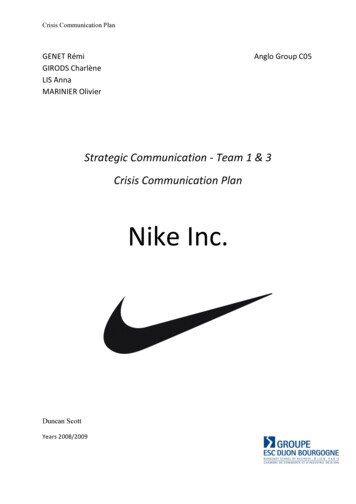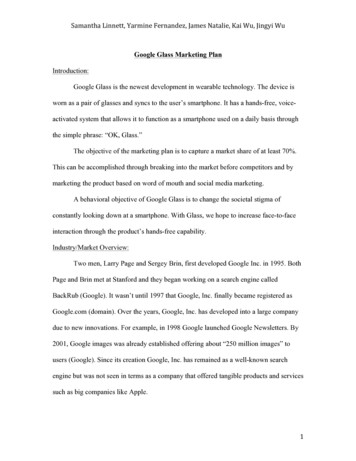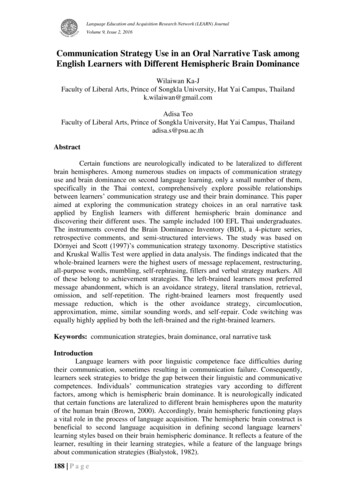
Transcription
We are building a future, together.Corporate Communication StrategyChuck GaoUniversity of WestminsterMA Public RelationsMarch 31,14
Table of contents1 The Context2 The Situation Analysis3 The Stakeholder Analysis4 The Communication Objective5 The Communication channel6 The Implement7 The Evaluation8. The Timeline & Budget9. References
The ContextGoogle had a strong financial performance on 2013. They not only had met theirfinancial obligations, but also performed far better than expected. The latest Googlefinancial report (third quarter 2013) shows that Google stock surpasses US 1000 forfirst time, and according to Siliconrepublic, Google noted a third-quarter net profit ofUS 2.97bn – a rise of 36.5pc – amounting to US 8.75 per share. The strong financialperformance can also been traced on the share price. Google's stock price rose 58.4percent in 2013, breaking the 1,000 mark for the first time, while annual revenueincreased 21 percent to 55.5 billion. Most of the stakeholders are confident andpositive about company’s future because its financial performance. According toCNN, Google revealed Tuesday that its former CEO, Eric Schmidt, will receive 106million in bonuses based on the search giant's 2013 performance. This news generatedlots of coverage and business reviews along with blogs, mostly of people showedtheir confidence about Google’s financial performance. Moreover, Socialmentionshows the sentiment towards Google is either positive (approximately 50%) or neutral(approximately 80%).However, the company’s performance in China doesn’t seem to be very optimistic.According to China Internet Watch’s latest report, Google’s China search enginemarket share by revenue in Q4 2013 accounted for just 11.9%, which was roughly 65percent lower than Baidu (76.6%), the China search engine giant.
na-search-engine-market-update-q4-2013/)The statistics makes a striking contrast compared to the search engine market in othercountries in the global market like UK. (See pie chart below)(Source:http://theeword.co.uk/info/search engine market.html)As the chart shows, Baidu held its leading position in China search engine market.Both its efforts on PC and mobile devices contributed to its achievements. However,Google China’s market share dropped slightly as the competition among searchengines became more competitive. What’s more, Google had been losing its productmanagers and IT elites in China, Google’s market share was encroached bit by bit. It's
worth noting that, prior to pulling out of the country, Google’s search enginecontrolled 29% of the Chinese market.This situation is mainly because Google pulled out of China in 2010 as a result ofnumerous hacking attacks on the U.S. that originated from inside the country. Despitethe fact that China has more than 560 million people who use the Internet, Google hasno plans to return its services there. CNET reports that during Google’s annualshareholder meeting on Thursday, chairman and former CEO Eric Schmidt said hewas “troubled by continued reports of censorship and spying on people” by theChinese government. He explained that until China changes the way it treats itscitizens, Google has no plans to invest more resources into the country.Anyway, China is too tempting a market for Google to write off. Many clues showGoogle is planning going back to China. According to local media sources, it appearsthat over the weekend, the homepage of the Chinese Google domain was quietlymade accessible. Moreover, Google Chairman Eric Schmidt said on January that thetech giant's encryption services could eventually open up countries with stringentcensorship rules, which means China is definitely a jigsaw of company’s future plan.The Situation AnalysisStrengths Google owns one of the most powerful brands in the world, so popular that the company s brandname is used as a verb. Technological strength. The more we use Google, the better the company gets at building itsgigantic database of relevant information. That's a self-sustaining competitive advantage: morepopularity means a better product, which makes the services more useful and demanded. The company is financially very solid, it generates big cash flows from its online advertisingbusiness and reinvests heavily for growth in different areas. Projects like the company's self-driving car, Google glasses and fibre optic network capabilitiesshow that Google is still a leading innovator. In 2009, one year before Google quit Chinese market, 700 people employed at Google Chineseoffices, 300 million revenues were create in this year, and it accounts for 1% of corporate revenues.The market share was 24%Weaknesses Necessary censorship in China (The great firewall, which blocks Youtube and some other Googleservices)
Google do not have strong relationship with Chinese government, which would be a vitalproblem because their competitor Baidu have a solid government background. Google have not been familiar with Chinese upcoming university graduates. Patent litigations, privacy issues, lawsuits and all kind of regulations can be a risk factor forGoogle. Google have to rebuild its reputation in China. Google does not have too much CSR campaign in China.Opportunities China has a massive internet market of which Google possesses 16.6% of the market, second bya large margin to Baidu, so the company still has a lot of room to grow in this massive market. Google has a very valuable and unique asset in Youtube. The biggest online video platform in theworld could become a money making machine via advertising and/or premium content in the followingyears. It will be very competitive compared with Chinese video sites like Youku. Gmail, Chrome, Google Docs and Google Maps are just a few examples. The company owns anenormous ecosystem of services and applications which offer plenty of opportunities for furthergrowth. The company has the scale and financial resources to acquire promising technologies andpotential competitors. They can acquire some Chinese local companies if they need.The CompetitorsCensorshipThe Chinese Internet censorship, as known as the great firewall, is conducted under a wide variety oflaws and administrative regulations. Google's YouTube video service has been inaccessible in Chinasince 2009, while access to other services in China are blocked sporadically.(Source: http://en.wikipedia.org/wiki/List of websites blocked in China)Anyway, according to Wall Street Journal, Google’s executive chairman Eric Schmidt has alreadyexpressed his view that government censorship can be ended within a decade with the help ofencryption, and now he’s singled out China where Google will work on doing so.Search engine MarketMajor competitors of Google in Chinese search engine market include Baidu and Microsoft. Baidu isthe leading search engine in China, and battles ferociously with Google for market share. Microsoftrecently launched its version of the search engine Bing, and since has launched an advertisement
campaign in favor of Bing.Mobile Device MarketThere is not much difference as other countries in Chinese mobile device market. Apple is still thebiggest competitor. Apple owns the high-end markets in smartphones and tablets, and a hugeecosystem for its products. The Cupertino giant has recently renewed its line of products, and willprobably gain market share versus Android over the next months. Google and Apple can coexist andboth be very profitable, but the competitive tension has been increasing lately, and that's a reason forconcern.The Stakeholder AnalysisA stakeholder is a person,d group, or organisation that can affect or be affected by an organisation'sactions, objectives, and policies. Stakeholders have varying needs and different stakeholders areentitled to different considerations.Google has a responsibility to manage its operations for the benefit of its stakeholders. Stakeholdersinclude not only the shareholders of the company’s stock, but also the employees, customers, suppliers,trade associations, and community. Google’s decisions may be influenced by the government, activistgroups, and the media, all who have their own agendas and responsibilities to the people they serve.Each stakeholder has a relationship with Google and this relationship is the source of the stakeholder’spower to affect Google’s decisions. Google’s distributed business model ensures that no stakeholderhas a level of importance that could alone change the direction of the company, but the way that themass of web users, media, and governments interpret their activity could influence the company’sobjectives.This communication strategy plan will focus at recruiting skilled graduate trainees on Chinese market,for the sake of Google’s future globalization strategy. Through this communication plan, we seek toshow an attitude that Google values global talent including Chinese graduates.In order to make an effective communication strategy for Google to recruit skilled graduate trainees,this analysis will mainly look at Google’s stakeholders who have power and influence for the purpose.To identify the audience, I will firstly use a stakeholder analysis matrix to find power stakeholders (keystakeholders), and then I will try to identify their influence by the use of the Power versus interest gridadapted from Eden and Ackermann (Making Strategy, 1998).Stakeholder analysis matrixSkakeholderStakeholder InterestsPower and InfluenceMediaThe news towards theReputationcompanyEmployeeSalaries & wages, JobLong-term development
rvice qualityDiversityCustomersGovernmentProduct availability,Revenue,Reliable quality,Reputation,Customer servicemouthPaymentoftaxes,Ensure legal workingRegulation,CompanyWordofsubsidies,taxation, Price, Quality, Productpayment,availabilityGrowth of purchasing.ShareholdersProfit growth, ShareElection of Directorsprice growth, DividendsCommunityUniversitiesEnvironment, local jobs,Reputation,local impactGovernment relationshipMore job position and aOffernew choice of careersupport the campaignpathPower versus interest gridMeet their needsKey playerBoard of ustomersGovernmentEmployeeCustomersIndustry AssociationUniversitiesLeast importantActivist GroupsCompetitorBoard of DiretorsShow oodwill,information,
In this communication plan, some messages will be conveyed to the audiences withemphasise of different elements. To be specific:For Customers: recruiting Chinese talent will greatly benefit Chinese customers withoffering whole Google services in Mainland China and create Chinese characterisedservice in the future. In addition, global customers will benefit by diversification ofthe Google services and contents. For example: Chinese results in Google searchengine, Chinese content’s on YouTube and Chinese data on Google map.For Shareholders: re-entry into the Chinese market means Google further steps up interms of globalization, more importantly, the revenue will increase in the near future.For Employee: new blood will join the Google family.For Media: many news story idea and angles will be created.Government: the contribution of taxes and creations of job positions in China.Industry Association: promote healthy development and offer more skilled talent forthe Chinese Industrial talent.Corporate communications will seek to drive reputation through the introduction andconsistent use of a single key message, to be used in all appropriate communications,the key message is: we are building a future, together.The Communication ObjectiveThe market size of Chinese Internet and Mobile are increasing significantly theseyears. As Google has a responsibility to manage its operations for the maximum benefit of itsstakeholders, thereis unlikely that Google can no longer give up on one of the mostpotential markets in the world.For the preparation of re-entry into the Chinese market, a communication strategy ofrecruiting skilled graduate trainees will be given. The aim of this corporatecommunication is to raise the company’s profile and cultivate the Chinese market’sgoodwill, while for the reserve of future management talents who are familiar with
China’s business environment. The objective of this communication is defined byinternal and external.Internal To position China as an important part of Google’s future plan. To improve staff engagement and motivation by bringing in Chinese talent. To ensure company have enough reserve of talents who are familiar with Chinesemarket for the preparation to turn back into China.External To tell the public and stakeholders that Google values Chinese market and globaltalent. To build relationship with Chinese public, government, Industry association andMedia. To build stakeholder’s confidence about Google’s future financial performance. To enhance the company image as market leader.The Communication channelA proactive approach to communication, maintaining and developing effectivetwo-way communication and working closely with our key partners are essentialcomponents of any activity. In order to implement the corporate communicationeffectively, a list of communication channel is selected:
Internal:External:The recruiting Campaign: Email Television stations Press Release Staff magazine Newspapers Social Media sites Web sites University student unions Social Media University career centre LinkedIn Career Talks Government Job-hunting Websitesand intranet Newsletteroffices Job-hunting TVprogramme Job-hunting forum Job-hunting reviewwebsites Career fair University Campusactivity sponsorThe media focus will be Google’s future strategy structure and Google’ first timetrainee programme facing Chinese graduates.The ImplementationThe Corporate communication will m
This communication strategy plan will focus at recruiting skilled graduate trainees on Chinese market, for the sake of Google’s future globalization strategy. Through this communication plan, we seek to show an attitude that Google values global talent including Chinese graduates.File Size: 2MBPage Count: 16











